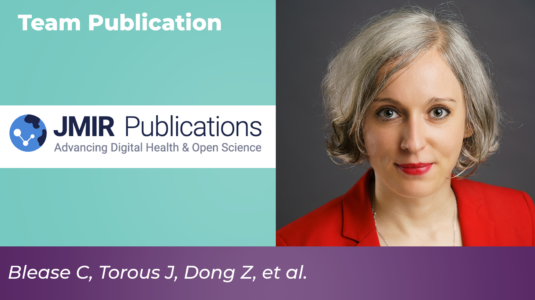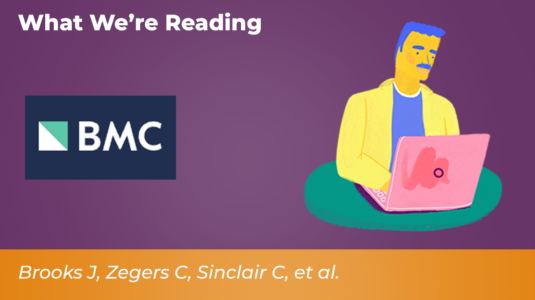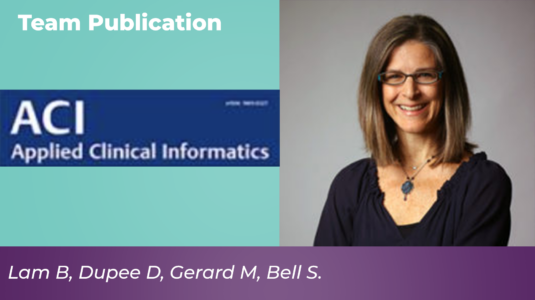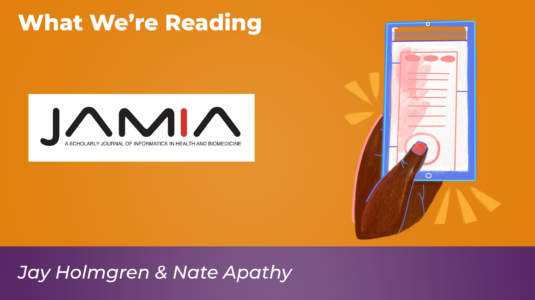This study provides timely information on the views of GPs in England regarding patient access to their web-based health records. Overwhelmingly, GPs were skeptical about the benefits of access both for patients and to their practices.
Clinician Views/Experiences
Understanding the Cures Act Information Blocking Rule in cancer care: A mixed methods exploration of patient and clinician perspectives and recommendations for policy makers
Patients with cancer and their cancer care teams want the ability to tailor information release based on individual preferences and goals. Understanding how to tailor implementation of the Information Blocking Rule is essential for retaining its benefits and minimizing unintended harm for patients with cancer.
A patient-centered approach to writing ambulatory visit notes in the Cures Act era
Most note-writing guides to date have focused on the experience of clinicians. Here, we build on these tips by integrating patient perspectives related to note-reading.
Assessing the impact of patient access to clinical notes on clinician EHR documentation
Using a national, longitudinal data set consisting of all ambulatory care physicians and advance practice providers using an Epic Systems EHR, we used an interrupted time-series analysis to evaluate the immediate impact of the policy change on clinician note length and time spent documenting in the EHR. We found no evidence of a change in note length or time spent writing notes following the implementation of the policy, suggesting patient access to clinical notes did not increase documentation workload for clinicians.
Sharing Clinical Notes and Electronic Health Records With People Affected by Mental Health Conditions: Scoping Review
PAEHRs in MHC may strengthen user involvement, patients’ autonomy, and shift medical treatment to a coproduced process. Acceptance issues among health care professionals align with the findings from general health settings. However, the corpus of evidence on digital sharing of EHRs with people affected by mental health conditions is limited. Above all, further research is needed to examine the clinical effectiveness, efficiency, and implementation of this sociotechnical intervention.
Patients Contributing to Visit Notes: Mixed Methods Evaluation of OurNotes
OurNotes interests patients, and providers experience it as a positive intervention. Participation by patients, care partners, clinicians, and electronic health record experts will facilitate further development.
The benefits and harms of open notes in mental health: A Delphi survey of international experts
This survey used a Delphi poll – an established methodology used to investigate emerging healthcare policy, including in psychiatry. International experts who included health professionals and persons with lived experience of mental healthcare were asked to give their opinions, anonymously, in three rounds of online surveys, and to offer their views about the potential benefits and harms of online access to mental health notes. Experts – drawn from 70 experts from six countries – agreed patients’ access to their mental health notes could offer multiple benefits and few harms.
Risks and rewards of increasing patient access to medical records in clinical ophthalmology using OpenNotes
Clinicians in ophthalmology perceived both benefits and consequences of increasing patient access to ophthalmic records, and there were significant correlations between these perceptions and their conceptions of the clinician–patient relationship. This is the first study to assess potential ophthalmology provider attitudes toward sharing ophthalmic records. Although limited in sample size and power, this study demonstrates some ways patient-accessible ophthalmic records can affect the clinical practice of ophthalmology and emphasizes the unique challenges of OpenNotes in ophthalmology.
Open notes sounds great, but will a provider’s documentation change? An exploratory study of the effect of open notes on oncology documentation
This study evaluated whether implementing open notes at a large academic medical center was associated with changes in measures of the length and readability of progress notes written by hematology/oncology clinicians. After the implementation of open notes, progress notes and A&P sections became both longer and easier to read. This suggests clinician documenters may be responding to the perceived pressures of a transparent medical records environment.
Physician Use of Stigmatizing Language in Patient Medical Records
This qualitative study found that physicians express negative and positive attitudes toward patients when documenting in the medical record. Although often not explicit, this language could potentially transmit bias and affect the quality of care that patients subsequently receive. These findings suggest that increased physician awareness when writing and reading medical records is needed to prevent the perpetuation of negative bias in medical care.







